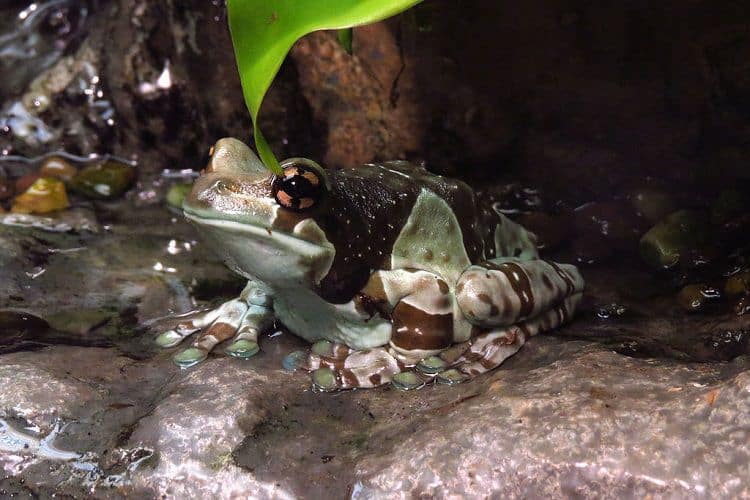Table of Contents
When you first got a frog as a pet, you might have been surprised at how noisy these amphibians can be from time to time. In fact, (as nocturnal creatures) frogs can make quite a bit of noise at night. But why is this?
Why is My Frog Croaking?
Most people are aware that frogs make a croaking sound. In fact, as children we are taught that this croaking noise is synonymous with frogs. But why do these creatures do this?
Frogs make a variety of sounds in order to communicate, and they croak for many different reasons. Sometimes it is to attract female frogs during breeding season. To a frog, croaking is a nice sound and the frog that croaks loudest usually wins the girl!

Red-Eyed Tree Frog 
Gray Tree Frog 
African Dwarf Frog
If you live close to a pond, you might notice that croaking seems more intense after it has rained. Well, there is a good reason for this. Frogs like wet weather and for females, fresh pools of water are the perfect place to lay eggs. So when these optimal conditions prevail, croaking can become very loud indeed.
Croaking among males is also used as a means to ward off other male frogs from their territory.
What Other Sounds Do Frogs Make?
As well as the typical croaking sound, you might be surprised to know that frogs can actually make a screaming-type noise when under threat. According to Jules Howard from BBCWildlife, the common frog can often be heard shrieking to warn off a predator such as a dog or a cat [source]. To some people this noise can sound like the cry of a startled baby.
How Do Frogs Make Sound?
Have you ever wondered how frogs actually make the loud sounds they do? Particularly very small frogs, which can make a massive racket?

White’s Tree Frog 
Argentine Horned Frog 
Phantasmal Poison Frog
You might be surprised to find out that frogs actually have vocal cords like humans do. However, in addition to these vocal cords frogs also have what is known as a vocal sac. This vocal sac acts much like an amplifier when it is inflated to create loud croaking sounds.
Frogs take a breath and then close their nostrils in order to make their distinct croaking sound. They then force the air backwards and forwards between their lungs and vocal sacs. This allows the vocal cords to vibrate the air and make the sounds.
Photo Credits:
- Featured Image (Amazon Milk Frog): D. Gordon E. Robertson
 – This file is licensed under the Creative Commons
– This file is licensed under the Creative Commons Attribution-Share Alike 3.0 Unported
Attribution-Share Alike 3.0 Unported license.
license. - Gray Tree Frog: Robert A. Coggeshall – public domain
- Red-Eyed Tree Frog: Careyjamesbalboa
 (Eric De Vries) – public domain
(Eric De Vries) – public domain - Phantasmal Poison Frog: Deepinon at https://www.flickr.com/photos/deepinon/110593290/
 – This file is licensed under the Creative Commons
– This file is licensed under the Creative Commons Attribution 2.0 Generic
Attribution 2.0 Generic license.
license. - Argentine Horned Frog: Melanie Mae Bryan – This file is licensed under the Creative Commons
 Attribution 2.0 Generic
Attribution 2.0 Generic license.
license. - White’s Tree Frog: Bidgee
 – This file is licensed under the Creative Commons
– This file is licensed under the Creative Commons Attribution 3.0 Unported
Attribution 3.0 Unported license.
license. - African Dwarf Frog: https://phil.cdc.gov/details.aspx?pid=11835
 – public domain
– public domain

